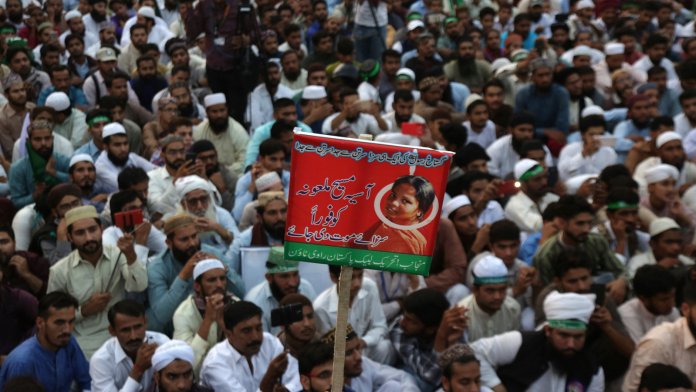In a historic development, Kiran Bibi and Shaukat, a Christian couple embroiled in a contentious blasphemy case, were granted bail on October 18, 2023. This decision was made following a hearing presided over by Additional Sessions Judge Mian Shahid Javed, despite Ayesha Tufail, Assistant District Public Prosecutor (ADPP) strongly opposed the bail application.
The case had its origins in a complaint filed under Section 295-B of Pakistan’s blasphemy law, which specifically deals with the “Defiling, etc., of a copy of the Holy Qur’an.” This statute carries severe penalties, including the possibility of life imprisonment, for those found guilty of deliberately defiling, damaging, desecrating, or using a copy of the Holy Qur’an or its extracts in a derogatory manner or for unlawful purposes.
According to the First Information Report (FIR), the complainant, Muhammad Tamoor, reported an unsettling incident that occurred on the night of September 8, 2023. He claimed to have witnessed several pages descending from the rooftop of a nearby house, situated near the Khanki Tikka shop, close to the Rangers headquarters on Millwali Street in Chaudhry Colony.
Intrigued by the sight, he ventured to the house and knocked on its door. Kiran Bibi, the lady of the house, responded, and he inquired about the scattered papers. She explained that some of these pages might have been accidentally thrown by her young daughters, Sundas and Ruby, as well as her son, Sabir.
Tamoor was granted permission to enter the house and investigate further. On reaching the rooftop, he discovered a pink bag behind a water tank, containing additional pages from the Qur’an. Alarmed by this discovery, Tamoor promptly contacted the emergency police, who arrived at the scene and took possession of both the bag and the Qur’anic pages.
The defense counsel representing the petitioners emphasized key points from their petitions in support of the bail plea. In response, Assistant District Public Prosecutor, supported by the complainant’s legal counsel, vehemently opposed the bail petitions, citing multiple legal and factual grounds.
While both accused/petitioners were explicitly named in the FIR, it was evident from the FIR itself that the complainant had not personally witnessed the accused individuals discarding the torn pages from the rooftop. Kiran Bibi’s willingness to allow Tamoor to enter her residence for an on-site investigation strongly suggested that her children, who had purportedly discarded pages from a 9th-grade Islamic studies book, were indeed minors.
A fundamental requirement of Section 295-B PPC is the element of willful damage or defilement of the original text of the Holy Qur’an. However, in this specific case, this crucial element appeared to be missing. There was no credible eyewitness testimony affirming that the accused parties had deliberately committed such a grave offense. Furthermore, the circumstances surrounding the incident remained ambiguous, casting doubt on whether the accused or someone else was responsible for the alleged act.
In light of these significant considerations, the court concluded that a more extensive inquiry was necessary. Consequently, both post-arrest bail petitions were granted, and the accused were released on bail, subject to the condition that they provide surety bonds of Rs. 100,000 each, along with one local surety each, to the satisfaction of the learned trial court. This decision underscores the importance of conducting a thorough investigation to establish the facts surrounding the case and ensure that justice prevails.
Mr. Nasir Saeed, Director of CLAAS-UK, commends the courageous decision of Additional Sessions Judge Mian Shahid Javed in deciding this case based on merit. This landmark judgment breaks from the norm, where trial courts often refuse bail, burdening accused individuals with lengthy legal battles that can extend all the way to the Supreme Court. Many victims of blasphemy laws languish in prison for years without resolution.
Mr. Nasir Saeed highlights the urgent need for appropriate changes to Pakistan’s blasphemy laws to prevent innocent individuals from suffering for crimes they did not commit. He also emphasizes the necessity of conducting regular hearings in such cases to ensure that innocent individuals do not endure prolonged imprisonment.



